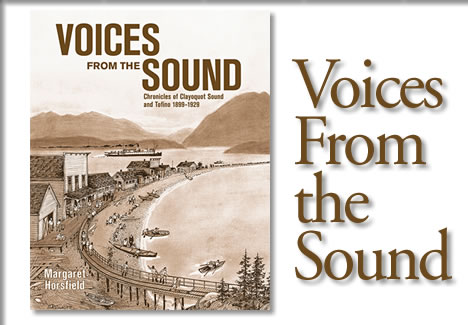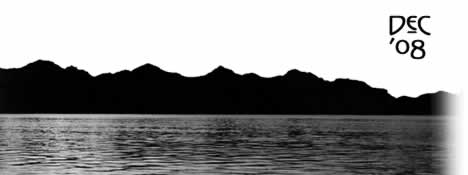
Voices from the Sound:
A Winter's Taleby Margaret Horsfield
Voices from the Sound is Margaret Horsfield's new book about the west coast in the early 20th century. Acclaimed in the Vancouver Sun as "a sumptuous, splendidly illustrated production..." this book includes a chapter called…
"A Winter's Tale."
This chapter tells of anxious days on the coast in late November and early December of 1911. Up at Hesquiat, Father Charles Moser recorded it all in his diary. The following is an excerpt from "A Winter's Tale."
November 28, 1911:
Gale of wind shook my house all night long. Gale continued till noon; rain from 8 am till noon..... Most of the Indians stopped at Anton's Pt to wait for steamer, but no steamer came... At 4 pm an Indian coming from Estevan brought news that steamer had been at Kyuquot this morning... she should be here any time."She should be here any time." Everyone shared that hope: the overdue steamer Tees should be at Hesquiat soon. But as November 28 went by, and November 29, tension mounted. This was no longer a normal delay. A few hours late, half a day, a day - such delays were unremarkable, but the Tees was now seriously overdue: she should have steamed around Estevan Point into Hesquiat Harbour three days earlier.
Father Charles's unease grew. Over at the safe anchorage of Anton's Point, the canoes filled with cargo awaited the steamer. They were at anchor, some of them loaded with valuable beef all wrapped and ready to be sent down the coast to Christie School. The canoes had to be watched day and night in expectation of the steamer's arrival, and this vigil could not continue much longer. Already one of the canoes had broken loose from its moorings in the high wind, and retrieving it had taken many hours.
On November 29, Father Charles wrote in his diary: "All Indians at Anton's Pt. returned to the village to sleep. They are getting tired to watch for steamer, so today they stayed and worked at home. After my Mass I alone went to Anton's Pt. but returned after 12 o'clock noon, and cooked a good dinner, the first decent meal since Sunday on acct of expecting steamer any minute."
November 30 came, and still no sign of the steamer, still no definite news. What had happened to the Tees? In Victoria, the Colonist at last made the matter public "There was much anxiety regarding Tees since early yesterday. The Northwestern en route to Seattle from Alaska, caught a wireless message ... 'Tees struck rock Kyuquot Sound.'...Throughout the day every operator in the coast wireless service listened for further messages, but nothing was learned." Rescue vessels were in the area, but Father Charles recorded in his diary that "steamers looking for Tees have not yet found her owing to thick fog." The silence lengthened.
Images of shipwreck rose, stark and terrible, in the imagination of anyone on the coast who knew the Tees was in trouble. Not again, surely not again. Lurid and tragic stories of previous shipwrecks haunted everyone on the coast. Worst of all were the stories of the Valencia. Only five years earlier, at Pachena Point, over a hundred people had perished in that most piteous of shipwrecks. Father Charles well remembered receiving a note from the telegraph operator at Tofino on the afternoon of January 22, 1906: "Large steamer just gone down between Cape Beal and Clo-oose...100 drowned, 9 saved; no particulars yet." Many of the victims had stayed with the Valencia, clinging to the rigging for desperate hours, only to be pitched into the churning water as the ship split up in full view of horrified onlookers on the cliffs, less than half a mile distant. The Valencia's terrible fate had set new standards for dread and horror on the coast. And now the Tees had fallen silent, lost somewhere in Kyuquot Sound. Surely not again.
Thankfully, given the grim circumstances, not many people were on board the lost and ominously silent Tees -- fewer than fifty all told, including crew and "seven Chinamen," as always counted as a separate species. The Tees regularly carried well over a hundred people, only weeks earlier she had carried 147 passengers on a particularly busy trip. The lost ship was heavily loaded with cargo, though. Just before the accident, she took on over five hundred barrels of whale oil at the Kyuquot whaling station, and 150 tons of china clay from the workings at Easy Creek.
The Colonist knew from past experience that any ship missing at sea must be recalled with the loftiest of sentiments and in the most lavish language, guaranteed to wrench the hearts of all readers. This was no the time to recall how uncomfortable Tees was, a "wet ship," mostly underwater in a high sea, according to her critical crew, and a "blunt-nosed ugly duckling" to boot. Not a popular ship, Tees was known as the "Holy Roller" on the coast. More of a plodder than a heroine on the high seas, she was capable of doing, at best, nine knots. Ignoring such details, the Colonist dwelled on the dramatic possibility of doom and disaster, putting into words the most bitter fears of local residents: "Many saw a wrecked ship, her decks awash with breaking seas, death and disaster, and for fear that the seas might be battering the steel sides of the staunch coaster, the rescue steamers struggled in the gale."
On December 3 the rescue vessels William Jolliffe and Salvor were at last able to enter Kyuquot Sound after repeated and risky attempts. They hastened to the aid of the afflicted ship, fearing the worst.
The rescue was entirely anticlimactic. The Tees was perfectly safe. Indeed, she had never been seriously endangered at all. The Victoria Colonist, so poised for a disaster, sounded almost chagrined at this insipid ending to the story: "The complement on board suffered nothing more than the missing of one meal of the usual three, and they sang and laughed, and enjoyed the amusements the ship's officers provided for them, while thousands imagined pictures that differed immensely from this condition of affairs."
Arriving at Easy Creek, "in a snug cove...in waters as calm as those of James Bay," as the Colonist disgustedly reported, the rescue vessels discovered the Tees and all aboard her to be in fine form. Although the rudder had jammed on the rocks and the propeller was stripped, the ship was not holed, and the passengers seemed in almost indecently good spirits. The chief steward had done all he could to make the passengers happy and comfortable: "We...fortunately had some good musical talent, so we arranged concerts, mock trials, etc...Mr Ramsay had a piccolo and with his solos some songs and other entertainment we passed the time." The passengers on the Tees even managed to obtain fresh meat when two of the men went ashore and killed a wild bullock, butchering it with "an axe and an old bread knife."
Given that there are few images less pitiable than stranded passengers cheerfully eating roast beef dinner to the accompaniment of a piccolo, the Colonist turned elsewhere for a stirring story, sparing no hyperbole reporting how the valiant rescue vessels "twice...were almost wrecked on outlying reefs during a gale blowing 70 mph" as heavy seas broke over them in thick fog. Captain Logan of the Salvor explained that his boat and the Jolliffe "were several times near... disaster. They were five times in the breakers and while those on Tees held mock trials, concerts, etc, we were in a hurricane." Finding the Tees unharmed, Logan commented caustically that "it was a small affair for the amount of risk taken."
The passengers of the Tees transferred to the Salvor and resumed their journey down the coast. They arrived in Victoria on December 5, in fine form, and a mere seven or eight days late.
Margaret Horsfield's new book Voices from the Sound in available at local booksellers in Tofino and Ucluelet and also can be ordered direct by calling 1 888 858 5455. Check out the website voicesfromthesound.com for more details.
Tofino Time Magazine December 2008
- Tofino in December
- Tofino Winter Surf: Bigger is Better!
- Tofino tides: Tide table for Tofino December 2008
- Concerts in Tofino: December 2008
- Tofino Abstract - a story by Greg Blanchette
- First chart of Tofino by John Meares from 1790
- Tofino book review: Rumours - Jan Janzen's new book
- Tofino artist Deanna Lankin
- Tofino artist Sol Maya
- Christmas in Tofino: The weeks before xmas
- Voices from the Sound: A Winter's Tale
- Tofino kayak trip: Slipping by Solander
- Tofino storms: Happy thoughts on lousy weather
- Tofino Gardening in December
- Tofino Horoscope for December
- Events in Tofino: December 2008
- Community Directory: Goods & Services in Tofino
tofino | tofino time | activities | accommodation | events | directory
maps | travel | food | art & artists | photos | horoscope | tides
search | magazine | issues | articles | advertising | contact us
hosted in tofino by tofino.net & studio tofino
© 2002-2014 copyright Tofino Time Magazine in Tofino Canada

Voices from the Sound: A Winter's Tale, an excerpt from Margaret Horsfield book on life in Clayoquot Sound in the early 20th Century.

